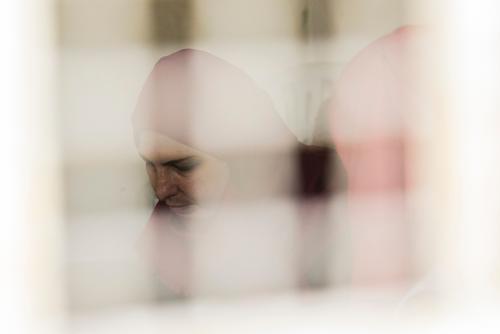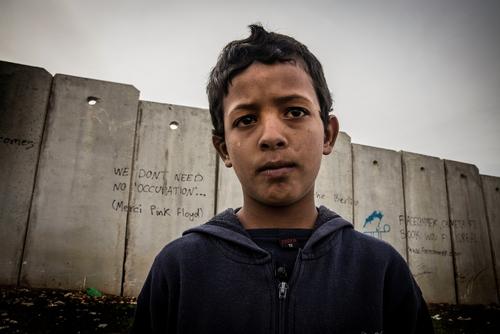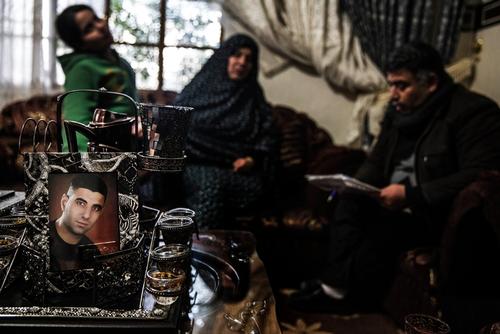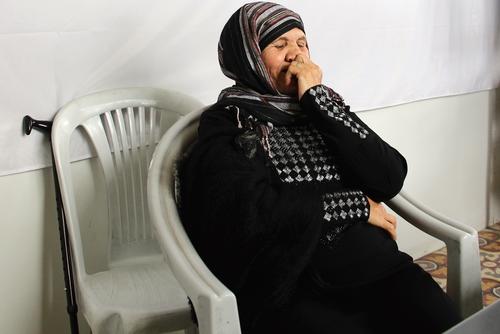Occupied Minds is a series of stories about Médecins Sans Frontières (MSF) patients affected by the Israeli-Palestinian conflict. They are people receiving assistance from MSF mental health teams, currently in Hebron, Nablus, Bethlehem and Ramallah. The stories are collected by the MSF teams. Occupied Minds seeks to reflect the reality of daily life under occupation for MSF patients.
Locked in Tel Rumeida, Hebron
In November 2015, the Tel Rumeida neighbourhood was declared a 'closed military zone'. All Palestinian families living there had to register and were given a number. No visitors, family members, ambulances or workmen were allowed in, unless they had been given clearance by the military authorities. As of May 2016 this order has not been renewed, but the tight control has continued. Nisreen Al Azzeh lives in Tel Rumeida with her four children - two girls and two boys - next to one of the most infamous and controversial settlements (the first settlers' caravans arrived in Hebron in the mid-1980s).

Nisreen's husband died in October 2015, two months after undergoing heart surgery and the day when tear gas was used profusely in the city to repress clashes. According to Nisreen, the gas reached their neighborhood. Her husband felt very tired and coughed a lot before losing consciousness. The ambulance couldn't reach them in time, "so we used a blanket as a stretcher and some young neighbours took him to the hospital," explains Nisreen. "But at the checkpoint we were stopped for another 10 minutes. He died at the hospital. They tried to revive him, but he didn't respond."
Her husband, Hashem, used to work for UNRWA (United Nations Relief and Works Agency for Palestine Refugees in the Near East), and then later he became a tourist guide, "to show tourists how difficult it is to live under these circumstances, being locked in, the main street closed ... and having to reinforce our windows with metal bars because settlers throw stones at us … they even break into our house."
Nisreen, who came to Hebron in 1993 after living in Amman as a Palestinian refugee, had always been an artist, but she took to painting more regularly after the intifada in 2000 and became more dedicated in 2006. Painting was her way to find freedom while having to stay inside the house in order to observe curfews and avoid checkpoints and harassment. With some regular financial help from tourists who happened to see her paintings, she started to work steadily, and after her husband's death it became a way to provide for her family.
"I paint about the situation, the old city in Hebron, about military checkpoints, the suffering, the wire fences, the fact that the entrances to my house are blocked with wire so we can't go to the main street, the fact that they just want us to stay at home," she says. One of Nisreen's favorite paintings is the one of her trees. "The settlers took advantage that we weren't at home. We just went out for a few hours, and they brought a saw and they cut down my trees. I had an explosion of emotion inside me, so I painted exactly how they cut down my trees. And now the trees are growing back, they're growing from the roots. Can you imagine that? God hasn't abandoned us."
Nisreen paints mainly at night, when the children are asleep and she can get some peace and quiet. She has tried to overcome the sadness she feels after her husband's death. "I focused on the emotional state of the children and how to get out of the sadness that we feel, the loneliness, the fact that the children are locked in, that they cannot play outside. And the fact that we don't get any visits and we can't visit anyone and come back safely like we used to do before. We feel unsafe all the time as the settlers can come at any moment and beat us or shoot at us. It's not just the settlers, it’s the soldiers too, and the feeling of insecurity is terrible."
Nisreen has received support from MSF psychologists, and she has also tried to encourage her children to paint, to express their feelings so they can process them. "I've also got them things they can use in the house, because they can't go out. So they have a phone and a computer and they can play with them when they finish studying. The atmosphere has changed, they are better emotionally."
Nisreen explains that since the area was declared a closed military zone, it has become a ghost town. "We became prisoners. We live in a prison surrounded by military checkpoints. They are just conveying the message 'if you don't like it then leave, leave, leave!'."
Even though Nisreen can't leave the house or the area as much as she would like, she maintains regular contact with the outside world through social media. "I tell those who know us that the fact that my husband is dead doesn't mean that everything is over. I am here, his children are here and we are staying here. I am staying although I am a lonely Palestinian woman. I am staying put and with the loudest voice I have."





